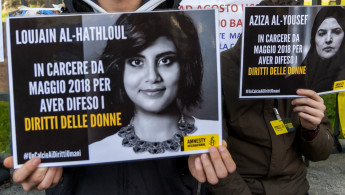Saudi Arabia using counter-terrorism laws to silence activists, says UN rights experts
A panel event entitled "Saudi Arabia: Time for Accountability" was held on Monday on the sidelines of the UN Human Rights Council, Reuters reported.
The panel found that Saudi counter-terrorism law and other procedures in the kingdom were "unacceptably wide and unacceptably vague", according to Fionnuala Ni Aolain, the UN special rapporteur on protecting human rights.
"It includes people who are engaged in promoting or inciting sit-ins, protests, meetings or group statements. Anyone who harms the unity or stability of the kingdom by any means. These are notoriously slippery terms," Ni Aolain said.
"These laws are used to directly attack and limit the rights of prominent human rights defenders, religious figures, writers, journalists, academics, civil activists and all of these groups have been targeted by this law," she added.
More than a dozen activists were arrested in Saudi Arabia in May last year in a sweeping crackdown on campaigners.
Many of them were accused of undermining security and aiding enemies of the state.
Some were subsequently released but others who remained in detention have been subjected to caning, electrocution and sexual assault, their family members say.
"Some are leaders of famous campaigns like the right to drive and abolishing male guardianship," said Zaynab al-Khawaja of the Gulf Centre for Human Rights, according to Reuters.
"These attacks are designed to mute their voices and dismantle the movements in the country."
Speaking about her group's report on allegations of torture in Saudi prisons, she said: "We highlight some of the torture methods that are being used in Saudi Arabia - electrocution, flogging, sometimes whipping, on the thighs for example, sexual assault where some women human rights defenders have been stripped, have been groped, have been photographed naked, some while handcuffed, and others while blindfolded."
On Friday, Riyadh's public prosecutor prepared for the trials of women's rights activists, SPA reported.
Those still detained include Aziza al-Yousef, a retired professor at Riyadh's King Saud University, and Loujain al-Hathloul - who was held in 2014 for more than 70 days for attempting to drive from neighbouring United Arab Emirates to Saudi Arabia.
Following their arrest, state-backed newspapers published front-page pictures of some of the activists with the word "traitor" stamped across them in red.
The kingdom also faces widespread international criticism over the assassination of Saudi Washington Post columnist Jamal Khashoggi at the Saudi Consulate in Istanbul in October, allegedly by members of Crown Prince Mohammed bin Salman's entourage, as well as over its years-long war in Yemen.
Follow us on Twitter: @The_NewArab





 Follow the Middle East's top stories in English at The New Arab on Google News
Follow the Middle East's top stories in English at The New Arab on Google News
![Israeli forces ordered bombed Gaza's Jabalia, ordering residents to leave [Getty]](/sites/default/files/styles/image_330x185/public/2176418030.jpeg?h=a5f2f23a&itok=_YGZaP1z)

